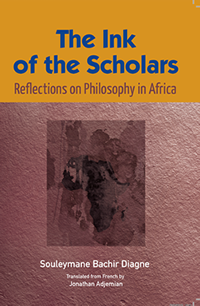The Ink of the Scholars: Reflections on Philosophy in Africa
Keywords:
The ink, Scholars, Philosophy, AfricaSynopsis
CODESRIA, Dakar, 2016, 116 p., ISBN 978-2-86978-705-6
What are the issues discussed today by African philosophers? Four important topics are identified here as important objects of philosophical reflection on the African continent. One is the question of ontology in relation to African religions and aesthetics. Another is the question of time and, in particular, of prospective thinking and development. A third issue is the task of reconstructing the intellectual history of the continent through the examination of the question of orality but also by taking into account the often neglected tradition of written erudition in Islamic centres of learning. Timbuktu is certainly the most important and most famous of such intellectual centres. The fourth question concerns political philosophy: the concept of “African socialisms” is revisited and the march that led to the adoption of the “African Charter of Human and Peoples’ Rights” is examined. All these important issues are also fundamental to understanding the question of African languages and translation.
Downloads
References
Abraham, William Emmanuel, 1962, The Mind of Africa, Chicago: Chicago University Press.
Adjaye, Joseph K., ed., 1994, Time in the Black Experience, Westport, CT and London: Greenwood Press.
Africanus, Leo, 1896, History and Description of Africa, translated by John Pory, London: Hakluyt Society. Available at http://www.learnnc.org/lp/editions/nchist-colonial/1982
Aké, Claude, 1987, ‘The African context of human rights’, Africa Today 34 (142): 5–13.
Apostel, Léo, 1981, African Philosophy: Myth or Reality?, Gent: Story-Scientia.
Austen, Ralph, 2010, ‘The medium of “tradition”: Amadou Hampâté Bâ’s confrontations with languages, literacy, and colonialism’, Islamic Africa 1 (2): 217–28.
Baba, Ahmad, 1992, La gratification des hommes de bien par l’exposé des mérites des ulama (translated and edited by Said Sami et Mohammed Zniber), Rabat: Institut d’Études africaines.
Benvéniste, Émile, 1971, Problems in General Linguistics, translated by Mary Elizabeth Meek, University of Florida Press.
Berger, Gaston, 1960, ‘Méthodes et résultats’, Revue prospective 6, November, Presses universitaires de France. Available at http://www.prospective.fr/idversionUtilisateur.asp?ID=16
Berger, Gaston, 1964, Phénoménologie du temps et prospective, Paris: Presses universitaires de France.
Berger, Gaston, de Bourbon-Busset, Jacques, Masse, Pierre, 2007, De la prospective. Textes fondamentaux de la prospective française 1955-1966, compiled and edited by Philippe Durance, Paris: L’Harmattan.
Bergson, Henri, 1935, The Two Sources of Morality and Religion, translated by R. Ashley Audra and Cloudesley Brereton, New York: Henry Holt & Co.
Bidima, Jean-Godefroy, 2013, Law and the Public Sphere in Africa: La Palabre and Other Writings, translated and edited by Laura Hengehold, Bloomington: Indiana University Press.
Bigo, Pierre, 1961, Marxisme et humanisme, third revised edition, Paris: Presses Universitaires de France.
Boele, Pieter, 2011, ‘Le “ tournant démocratique ” dans la philosophie africaine contemporaine’, Critique 771–72, April–September, special issue ‘Philosopher en Afrique’.
Bontick, François, 1985, Aux origines de la philosophie bantoue. La correspondance Tempels-Hulstaert (1944–48), Translated from Dutch and annotated by François Bontinck, Kinshasa: Faculté de Théologie catholique.
Bourgeois, B. and Havet, J., eds, 2001, L’esprit cartésien. Quatrième centenaire de la naissance de Descartes, Paris: Vrin.
Cassin, Barbara, 2010, ‘Philosophizing in languages’, Nottingham French Studies 49 (2): 17–28.
Cassin, Barbara, ed., 2014, Dictionary of Untranslatables: A Philosophical Lexicon, Princeton University Press.
Cendrars, Blaise, 1927, Anthologie nègre, Paris: Au Sans Pareil.
Césaire, Aimé, 1972 [1955], Discourse on Colonialism, translated by Joan
Pinkham, New York and London: Monthly Review Press. Available at h t t p : //www.rlwclarke.net/theory/SourcesPrimary/CesaireDiscourseonColonialism.pdf
Cisse, Youssouf Tata and Sagot-Duvauroux, J.-L., 2003, La Charte du Mandé et autres traditions du Mali, Paris: Albin Michel.
Collectif, 2008, L’Afrique répond à Sarkozy. Contre le discours de Dakar, Paris: Philippe Rey.
Collectif, 2008, La Charte du Kurukan Fuga. Aux sources d’une pensée politique en Afrique, Paris: L’Harmattan.
Colin, Roland, 2012, ‘L’origine de la formation par la recherche et la recherche-action, sur les traces d’Henri Desroche et de ses compagnons’, in Pierre-Marie Mesnier and Christophe Vandernotte, eds, En quête d’une intelligence de l’agir, Praticiens en recherche-action, Paris: L’Harmattan.
Copans, Jean and Couty, Philippe, 1976, Contes wolof du Baol, Paris: UGE.
Crepon, Marc, 2000, Le malin génie des langues: Nietzsche, Heidegger, Rosenzsweig, Paris: Vrin.
Descartes, René, 1992, Méditations métaphysiques, Paris: Flammarion.
Diagne, Mamoussé, 2005, Critique de la raison orale. Les pratiques discursives en Afrique noire, Paris: Karthala.
Diagne, Mamoussé, 2006, De la philosophie et des philosophes en Afrique noire, Paris: Karthala.
Diagne, Souleymane Bachir, 1985, ‘Sur le caractère littéraire de la littérature orale. Lecture des Contes wolof du Baol’, in Komparatistische Hefte 11, Voies nouvelles de l’historiographie littéraire, Bayreuth: Universität Bayreuth.
Diagne, Souleymane Bachir, 2000, Reconstruire le sens: textes et enjeux de prospectives africaines, Dakar: CODESRIA.
Diagne, Souleymane Bachir, 2001, ‘Esprit cartésien et mathématique de l’esprit’, in B. Bourgeois and J. Havet, eds, L’esprit cartésien. Quatrième centenaire de la naissance de Descartes, Paris: Vrin.
Diagne, Souleymane Bachir, 2004, ‘On Prospective: Development and a Political Culture of Time’, Africa Development 29 (1) 55–70.
Diagne, Souleymane Bachir, 2011, African Art as Philosophy: Senghor, Bergson, and the Idea of Negritude, Calcutta, London and New York: Seagull Books.
Diagne, Souleymane Bachir and Jeppie, Shamil, eds, 2011, Tombouctou.
Pour une histoire de l’érudition en Afrique de l’Ouest, translated by Ousmane Kane, Dakar and Cape Town: CODESRIA and HSRC.
Diagne, Souleymane Bachir, 2011, ‘Philosophie africaine et Charte africaine des droits de l’homme et des peuples’, Critique 771–72, August–September, special issue ‘Philosopher en Afrique’.
Diop, Birago, 1961, Les Contes d’Amadou Koumba, Paris: Présence africaine.
Dijan, Jean-Michel, 2012, Les manuscrits de Tombouctou. Secrets, mythes et réalités, Paris: Lattès.






